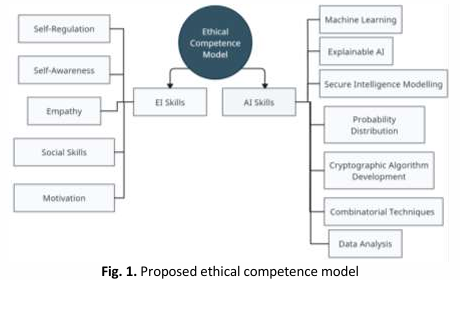Evaluating and Modelling Artificial Intelligence and Emotional Intelligence to Improve Cybersecurity Employee Ethical Competence Model
DOI:
https://doi.org/10.37934/ard.130.1.1325Keywords:
Artificial intelligence , cybersecurity, emotional intelligence, ethical competenceAbstract
Implementing an ethical competency model in a cybersecurity organisation is crucial for ensuring that employees are prepared to succeed in the complex ethical terrain of cybersecurity decision-making. The model comprises an ethical framework customised for cybersecurity, highlighting moral awareness across decision-making processes. This paper explores the integration of Artificial Intelligence (AI) and Emotional Intelligence (EI) to enhance ethical competence in cybersecurity professionals, highlighting the critical need for a balanced approach to technical efficiency and ethical decision-making. Through empirical research, including expert surveys and literature reviews, the study identifies critical AI and EI skills, develops a measurement instrument and proposes a model to assess and improve ethical competence in cybersecurity organisations. The research underscores the importance of AI in analysing cybersecurity threats and the role of EI in managing human factors, advocating for targeted training programs that combine AI capabilities with emotional and ethical awareness. Seven expert panels with an average of at least two years working as cybersecurity professionals were surveyed. The methodology involved applying exploratory factor analysis, reliability analysis and calculating the importance index with the developed questionnaire. EFA identified two constructs for each skill: AI in cybersecurity development and the integration challenges and EI in decision-making and leadership function in the operations. The instrument reliability was also consistent, with Alpha values ranging between .687 to .941. The findings suggest that developing an ethical competence model that integrates AI and EI can significantly contribute to establishing a cybersecurity environment that is both technologically advanced and ethically sound, addressing the complex ethical dilemmas faced by cybersecurity professionals.
Downloads























